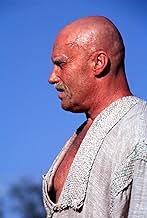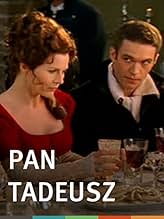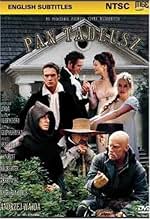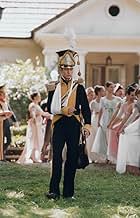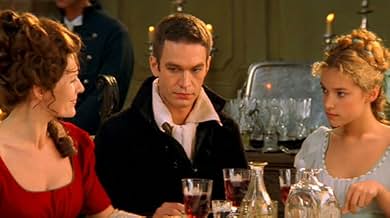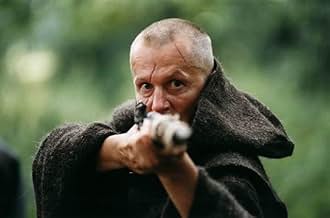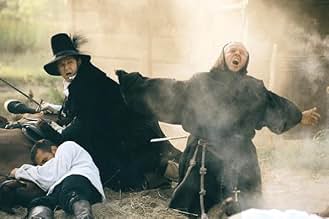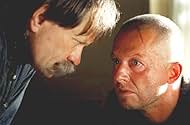Füge eine Handlung in deiner Sprache hinzuIn the early 1810s, Poles, part of Russia's client state of Lithuania, think independence will come if they join forces with Napoleon when he invades Russia. This unity of purpose, in one di... Alles lesenIn the early 1810s, Poles, part of Russia's client state of Lithuania, think independence will come if they join forces with Napoleon when he invades Russia. This unity of purpose, in one district, is undermined by two families, feuding since the head of one shot the head of the ... Alles lesenIn the early 1810s, Poles, part of Russia's client state of Lithuania, think independence will come if they join forces with Napoleon when he invades Russia. This unity of purpose, in one district, is undermined by two families, feuding since the head of one shot the head of the other twenty years before. There are hopes of a reconciliation through a marriage of Pan T... Alles lesen
- Auszeichnungen
- 7 Gewinne & 5 Nominierungen insgesamt
- Zosia Horeszkówna
- (as Alicja Bachleda-Curus)
- Rykow
- (as Siergiej Szakurow)
Empfohlene Bewertungen
"Pan Tadeusz", the movie, is a costume drama directed by Andrzej Wajda, the Polish director with some notable previous work under his belt. Into this film he brings mainly his experience and routine as filmmaker. The acting, with few exceptions, fails to impress, the actors simply mill around and recite the splendid lines by Mickiewicz. The camera-work is passable, with some nice shots of the beautiful locations. Also scenography and costumes are decent. What stands out is the music by the renowned Wojciech Kilar. But then again, it is standing out against the backdrop of a, frankly, not very exciting movie.
All in all: the most interesting feature of this film is unfortunately lost in translation from rhymed verse in 19th century Polish.
First of all, the screen play was created in a very unusual way. The dialogs were not written, but extracted from the poem, some of them being full rhyming lines and some only parts. Of course most of the meaningful and informative pieces were in the narrative section of the poem and somehow didn't make it to the screen. I'm all for "show not tell", but "don't show, don't tell, everybody knows it all from school" is not the top shelf of movie-making to me.
All that is shown is pretty people, pretty costumes, pretty interiors, pretty nature. Definitely pleasant to see for anyone who likes pictures with historical settings and would like to get to know something about the life in a particular time and place.
The movie really works only for people who have read the poem and have been taught about its historical background. After such preparation they can enjoy this multimedia reconstruction of the characters and places from the book, because that's rather what it is to me. Indeed, all the actors are good, music memorable and all the details nicely done, but this production really lacks the cinematic backbone and something that would allow it to be a movie on its own.
But why the costume drama? I really wish he'd left this one alone.
It's not unlike 1999's other bloated Polish historical epic, "Ogniem i mieczem" ("With Fire and Sword"). Here again Poles put aside their differences to prove they're the greatest people, or at least the greatest Slavs, on Bóg's green earth. Rah, rah. A crowd of Polish lesser gentry (rabble) armed with swords can defeat trained Russian musketry any day.
And, yes, I am of Polish descent myself, although I'm embarrassed to admit it in this jingoistic context. That's why I was at the special screening in the first place, sponsored by Toronto's Polish newspaper.
"Pan Tadeusz" shares another characteristic with its elephantine contemporary: its ability to confuse non-Polish-speaking members of the audience with its vast number of characters and their poorly defined interrelationships.
Both films too have a sudsy quality. So did "Gone With The Wind", but then character definition makes that historical epic a success. Tadeusz and Zosia are indistinct phantoms as personalities. Certainly no Rhett or Scarlett.
"With Fire and Sword" is more melodramatic than "Pan Tadeusz", but it's also more exciting. This film has a laudable grandeur which Wajda brings to the proceedings, but still I wish he'd picked a subject with a bit more substance.
Wojciech Kilar can be congratulated on his score. And Daniel Olbrychski is always good to see, even with scars all over his head.
It should be noted that Polish-speaking spectators at the theatre appeared to find this film quite enjoyable. They would be chuckling at clever turns of phrase in the dialogue, while the English titles would be saying something indescribably prosaic. Evidently the film loses nearly everything in translation.
We can expect high popularity level in Lithuania, and, maybe, to some extent in Belarus. But otherwise, the movie will be overlooked and probably discarded by the people who are not familiar with the history of the region, namely, with the Grand Duchy of Lithuania and the union with Recz Pospolita (The Polish-Lithuanian Commonwealth).
For Poles, Lithuanians, Belarusians this is a movie that brings back poignant nostalgia for the glorious past of the Duchy. For everyone else, it is just another historical ballad, based on the classical poem of Adam Mickiewicz.
The director, Andrzej Wajda, did a wonderful job -- the casting seems almost perfect, the whole organization is very nice, the acting is powerful. Some Polish movie critics predict that the film is going to be nominated for Oscar, but as far as it looks now, it is going to be huge -- but only on a regional scale.
The actors are mainly well-known faces in Polish cinema and yet all rise above the stereotypical images many of the audience have of them. The greatest example of this is Boguslaw Linda as Robak the Priest. In the most moving scene in the film he gives the performance of his life.
The harmonious blend of Wajda's direction and Wojciech Kilar's score is a sensual feast. It is a film which impresses a profound sense of beauty to such an extent that one could appreciate the sheer art of the film without even having to understand the language (I cannot vouch for the quality of the sub-titles in English as I saw it in its original version).
If you only see one foreign language film this year, make sure it is this one.
Wusstest du schon
- WissenswertesA polonaise composed by Kilar for this soundtrack gained a nation-wide recognition and became the opening tune for most high school proms. Before the movie the first dance was traditionally accompanied by Chopin.
- VerbindungenReferenced in Poranek kojota (2001)
Top-Auswahl
- How long is Pan Tadeusz: The Last Foray in Lithuania?Powered by Alexa
Details
- Erscheinungsdatum
- Herkunftsländer
- Sprache
- Auch bekannt als
- Pan Tadeusz: The Last Foray in Lithuania
- Drehorte
- Oporów, Lódzkie, Polen(castle)
- Produktionsfirmen
- Weitere beteiligte Unternehmen bei IMDbPro anzeigen
Box Office
- Budget
- 12.500.000 PLN (geschätzt)
- Laufzeit2 Stunden 27 Minuten
- Farbe
- Sound-Mix
- Seitenverhältnis
- 2.35 : 1
Zu dieser Seite beitragen


